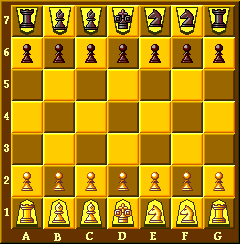Dragonfly
Dragonfly is a variant, invented by Christian Freeling in 1982. It is related to Chessgi, in the sense that it shares the parachuting rule with that game (and with Shogi.)
Rules
The game is played on a board of 7 by 7 squares, with black colored squares in the corners. Each player has a king, two rooks, two knights, two bishops, and seven pawns.
The opening setup is as follows:
 White:
White:
King d1; Rook a1, g1; Knight e1, f1; Bishop b1, c1; Pawn a2, b2, c2, d2,
e2, f2, g2.
Black:
King d7; Rook a7, g7; Knight e7, f7; Bishop b7, c7; Pawn a6, b6, c6, d6,
e6, f6, g6.
Kings move as in chess. Rooks, knights, and bishops also move as in orthodox chess, but when a player has captured a rook, knight, or bishop, he gets this piece `in hand'. A player may, instead of making a normal move, parachute the piece: put the piece on any empty square on the board. It is allowed to give check or mate when parachuting a piece. Note that only rooks, knights, and bishops can be parachuted: pawns disappear as usual when taken (and when a king is taken, the game is ended.)
Pawns move as usual, but with the following differences: they cannot make an initial double step, and when they reach the last row, they promote to a piece that the opponent has `in hand': when no such piece is available, moving to the last row is forbidden.
Castling is as in orthodox chess (both rook and king move two squares). Other rules are also as in orthodox chess.
Comments
In Issue 14 of Variant Chess, Freeling writes:
Because pieces are always in the game (either on the board or `in hand'), but pawns disappear when captured, the balance will eventually turn one way or the other. Draws are extremely rare.
Also, in that issue, it is commented that it seems a good idea of this variant that the Queen has been eliminated (when comparing to Chessgi.)
Sources
Issue 14 of Variant Chess, and The Encyclopedia of Chess Variants.
Written by Hans Bodlaender. Image copyright Mindsports; used here with permission. For more information on this, and other chess variants by Christian Freeling, see Mindsports, the website of Christian Freeling and Ed van Zon.
WWW page created: November 1, 1996. Last modified: January 23, 2005.